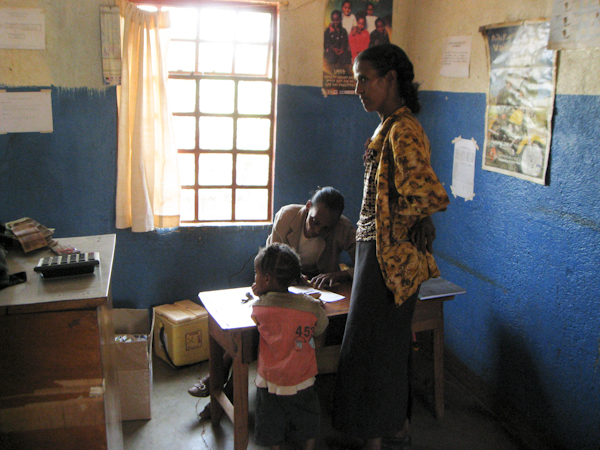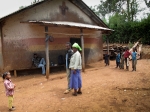 Loaded with drugs, dental tools, used reading glasses and medical supplies, the Land Cruiser sat idle as ten Ethiopians, Americans and a Britt wedged their bodies into the vehicle, vying for cramped space.
Loaded with drugs, dental tools, used reading glasses and medical supplies, the Land Cruiser sat idle as ten Ethiopians, Americans and a Britt wedged their bodies into the vehicle, vying for cramped space.
We were headed an hour west into remote Ethiopia, close to Sudan’s border, where an under-stocked, dilapidated clinic waited our arrival.
Satellite clinics within this mission based hospital cover over 100 miles of deforested valleys and hills, reaching areas forgotten by governmental planning. Desolate regions far from public transport and markets, people so poor that second-hand clothes and shoes remain unattainable. Many are barefoot, carrying heavy loads of wood or water to their distant villages.
The red dusted window played like a foreign film sans subtitles as Islamic holy men herded zebu humped long-horned cattle and sheep with matted, twisted tails slowly through rows of thatched huts supporting coptic religious crosses.
Fields of seasoned mangoes and avocados fell heavy from trees into villagers hands where they lined the dirt tracks selling fruit, charcoal and sugar cane.
A narrowed path turns into a village where a lone yellow acacia tree towers in the dry heat, its lower branches gone, a telling of fate as firewood is sparse and nothing goes unused. Children race to the car, pointing and howling, ‘ferengi,’(white foreigner) as we unfurl ourselves into the new surroundings, our clinic for the next several days.
A little girl, perhaps five, with crazy hair and a makeshift dress races between my legs, shrieking. She grabs my hand and slaps it into hers, triumphant. We eye each other curiously, making faces, slowing our pace to the clinic.
Towering above these children, I notice their heads, or in this case, compared with Tanzania, the lack of fungus on their scalp. It has changed, how I look and interact with the environment.
Past her smile, I notice palms that are peeling and skin on her extremities cracked, her fingers clubbed with deep nail ridges. A little boy running to catch us has a swollen belly with a protruding umbilicus, his reddish hair is sparse and brittle. We pass women squatting over charcoal, large goiters protruding under scarves. While malnutrition and deficiencies are evident throughout Ethiopia, so is the panacea. But the abundant wheat, fruit and vegetables grown as cash crops don’t find their way into the local diet. There are no government subsidiaries for vitamin or iodine supplementation.
Patients arrived early, miles away they came in droves, sick children and elderly in tow. Emanual, my interpreter of twenty-three, shouted for our first patient. An anxious young husband, wife at his side, an infant nursing under the head scarf, I had yet to sit down, no chance to organize my stethoscope, paperwork, they spoke hurriedly as he deciphered this Oromifa dialect. Weaving a tale of night sweats, lesions and infections, he finally motions his wife to uncover the child- feverish eyes look over her breast as a rotting odor engulfs my senses.
A moment of panic struck, what was I doing here in Ethiopia? Hours away from a hospital and people too poor to travel any distance were asking for help. I found myself struggling, wondering how I could help this family, one among hundreds waiting outside the broken blue door?
Experience builds confidence, until one day you reach Africa and everything changes. What we learned from medical books and mentors in the western world suddenly means very little. His face covered with small, irregular raised bumps, many secondarily infected with impetigo gave way to to large bulbous abscess draining from the neck and back of his head. Tight curls atop his head matted with virescent pus.
Lifting his weak body, she moved his small head aside and pointed to a clustering of new pimples on her arm. I had no idea what this strange mix of lesions could be, nor the illness taking over his body.
I had to get this boy to a hospital, IV antibiotics, fluids started. Without proper treatment, he would die. Urgently, I made my way through the crowded clinic looking for Shumate, my new colleague, an Ethiopian nurse with years of clinic medicine in the rural villages. I urged her to come quickly and see the boy. While distress covered my face with desperation and fraught, she glowing, entered like an angel, touching the child and his parents, quietly asking questions, a sense of calm.
She turns to me and in soothing English, explains what it could be- autoimmune, HIV, end-stage Syphilis, TB, fungus, bacterial… She agrees the child is septic and perhaps he will die. Pragmatically she continues, “There is nothing the family can do to change this, they can’t afford to get to a hospital and they can’t afford treatment, and we can’t help everyone because many children die in Ethiopia, that is the way.”
I sit back down, defeated.
Holding back tears, I watch as she takes over the grim situation, gently picking up the child encouraging the family, offering everything we have brought to help- injectable Penicillin, antibiotics, Tylenol, she offers a prayer, her smile holding strong, reassuring the family that life is a cycle, they are calmed by her efforts.
Her steady hand to my shaken heart, she leans forward, wisdom trickling from her soul, “You must help those whom you can and help those whom you can’t, you must offer hope, this is Ethiopia, that’s all there is to it.”
Those who could afford hospital visits had done so months ago, these are the remaining few from an impoverished country of 80 million, with nothing left.
I look around and see for the first time the raw humanity around me, hope riding on the shoulders of sickness, poverty and malnutrition. Seated upon wooden benches, soothing one another’s discomfort all waiting to be seen: malnutrition, whooping cough, lost pregnancies, deformities, infections, burns, epilepsy, AIDS, prolapsed uterus, scrotal hydrocele and the list goes on. Simple vaccines, surgery and proper treatment could treat most of the conditions, but funds, resources and education are lacking.
We are all they have, and once a month this organization offers them assistance with medical supplies, comfort and hope to those who are the poorest of the poor.
The boy and his mother were treated with our meager supplies and then the father, not wanting to take up resources as more sick families arrived, bundled up his family and began the long walk home to his village.
I remain conflicted about the roles and funds of NGOs, International Aide and Medical Organizations in the third world. I am still struggling with the many poor and critically ill patients who received our palliative care, but were unable to obtain further treatment or hospital admission.
Who am I to judge and in a world of such prosperity, why do so many still suffer?
[smooth=id:30]



 Follow
Follow
May 22nd, 2010 by Becca
Thanks for being so open about how this affects you emotionally. I think I would struggle with those conflicts as well. Maybe these experiences will percolate in you to find new solutions, on the other hand maybe they will give you a different knowing about the circle of life. None the less, I appreciate you being able to at least share your compassion with them.
May 1st, 2010 by Dianne / Mom
I appreciate what you are giving – the hardest part must be dealing with such difficult emotions.
April 30th, 2010 by Joni Kabana
Ahh, Darlene & Jay, we know this feeling so well. So many things to discuss when you get home here in Portland. We very much look forward to talking with you. Beautiful and thought-provoking depiction…your writing brings us back in full clarity.
April 29th, 2010 by Karly
I love and miss u sister…. ur so amazing and the world is blessed to have you in it. Hi J….
April 29th, 2010 by Aunt Carol
I love the way you give what you can to those who were born in the wrong place to get the benefits of developed medical and financial organizations. Life isn’t fair. Feel good about what you’re doing and I hope you can find the strength to give out as much hope as you can.
April 29th, 2010 by bill and donna
you two have made such a difference in the lives of so many, you should be proud,after reading your blog i know you two will be forever endowed with an inner knowledge of life and appreciation of life itself. so many people you have touched. dad